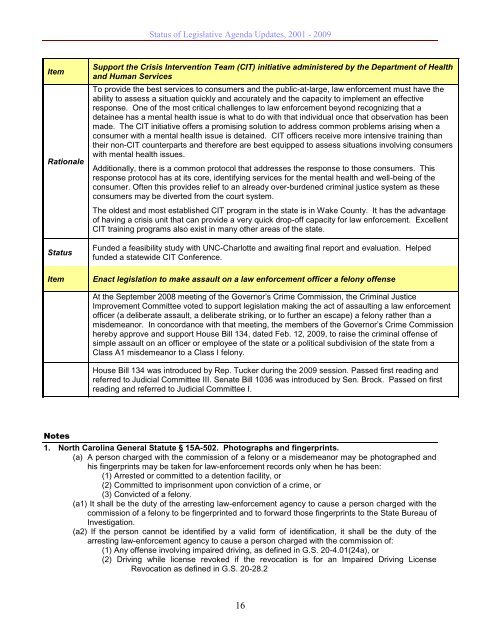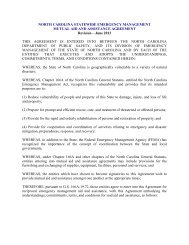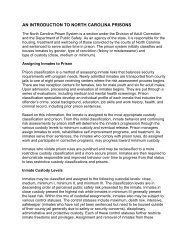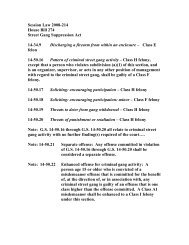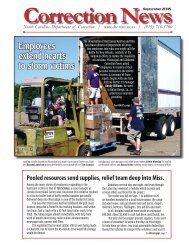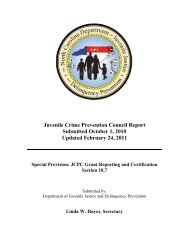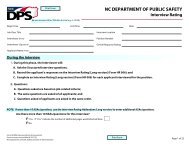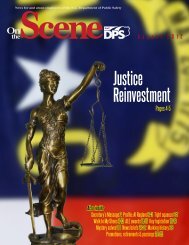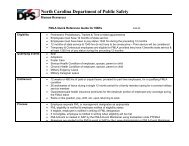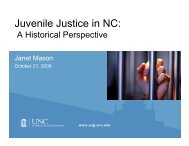GCC 2011 Legislative and Policy Agenda - North Carolina ...
GCC 2011 Legislative and Policy Agenda - North Carolina ...
GCC 2011 Legislative and Policy Agenda - North Carolina ...
- No tags were found...
You also want an ePaper? Increase the reach of your titles
YUMPU automatically turns print PDFs into web optimized ePapers that Google loves.
Status of <strong>Legislative</strong> <strong>Agenda</strong> Updates, 2001 - 2009ItemRationaleSupport the Crisis Intervention Team (CIT) initiative administered by the Department of Health<strong>and</strong> Human ServicesTo provide the best services to consumers <strong>and</strong> the public-at-large, law enforcement must have theability to assess a situation quickly <strong>and</strong> accurately <strong>and</strong> the capacity to implement an effectiveresponse. One of the most critical challenges to law enforcement beyond recognizing that adetainee has a mental health issue is what to do with that individual once that observation has beenmade. The CIT initiative offers a promising solution to address common problems arising when aconsumer with a mental health issue is detained. CIT officers receive more intensive training thantheir non-CIT counterparts <strong>and</strong> therefore are best equipped to assess situations involving consumerswith mental health issues.Additionally, there is a common protocol that addresses the response to those consumers. Thisresponse protocol has at its core, identifying services for the mental health <strong>and</strong> well-being of theconsumer. Often this provides relief to an already over-burdened criminal justice system as theseconsumers may be diverted from the court system.The oldest <strong>and</strong> most established CIT program in the state is in Wake County. It has the advantageof having a crisis unit that can provide a very quick drop-off capacity for law enforcement. ExcellentCIT training programs also exist in many other areas of the state.StatusItemFunded a feasibility study with UNC-Charlotte <strong>and</strong> awaiting final report <strong>and</strong> evaluation. Helpedfunded a statewide CIT Conference.Enact legislation to make assault on a law enforcement officer a felony offenseAt the September 2008 meeting of the Governor‟s Crime Commission, the Criminal JusticeImprovement Committee voted to support legislation making the act of assaulting a law enforcementofficer (a deliberate assault, a deliberate striking, or to further an escape) a felony rather than amisdemeanor. In concordance with that meeting, the members of the Governor‟s Crime Commissionhereby approve <strong>and</strong> support House Bill 134, dated Feb. 12, 2009, to raise the criminal offense ofsimple assault on an officer or employee of the state or a political subdivision of the state from aClass A1 misdemeanor to a Class I felony.House Bill 134 was introduced by Rep. Tucker during the 2009 session. Passed first reading <strong>and</strong>referred to Judicial Committee III. Senate Bill 1036 was introduced by Sen. Brock. Passed on firstreading <strong>and</strong> referred to Judicial Committee I.Notes1. <strong>North</strong> <strong>Carolina</strong> General Statute § 15A-502. Photographs <strong>and</strong> fingerprints.(a) A person charged with the commission of a felony or a misdemeanor may be photographed <strong>and</strong>his fingerprints may be taken for law-enforcement records only when he has been:(1) Arrested or committed to a detention facility, or(2) Committed to imprisonment upon conviction of a crime, or(3) Convicted of a felony.(a1) It shall be the duty of the arresting law-enforcement agency to cause a person charged with thecommission of a felony to be fingerprinted <strong>and</strong> to forward those fingerprints to the State Bureau ofInvestigation.(a2) If the person cannot be identified by a valid form of identification, it shall be the duty of thearresting law-enforcement agency to cause a person charged with the commission of:(1) Any offense involving impaired driving, as defined in G.S. 20-4.01(24a), or(2) Driving while license revoked if the revocation is for an Impaired Driving LicenseRevocation as defined in G.S. 20-28.216


